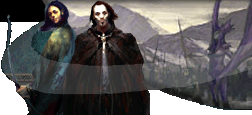Skills
Icewind Dale II uses a small portion of the 3rd Edition skills and the 3rd Edition method for distributing skill points based on class, level, race, and intelligence.
Your skills represent a variety of abilities, and you get better at them as you go up in level. The amount of skill points you receive every level depends on your character's race, class and intelligence modifier. You can select to use "cross-class" skills, but you will not be as adept at them as the classes more suited to using them. For example, spellcraft is easier for a caster to learn than one of the non-casting classes, hence it costs casting classes less to buy and they are more proficient in it.
The use of a skill is a success if:
1d20 + skill modifier (Skill modifier = skill rank + ability modifier + miscellaneous modifiers)
This d20 roll is made just like an attack roll or saving throw. The higher the roll, the better.
Many skills can be used even if the character has no ranks in the skill; this is known as making an untrained skill check. The ability modifier used in the skill check is the modifier for the skill's key ability (the ability most associated with the skill's use).
| Name |
Skill Modifier |
Trained/Untrained |
Class Skill |
Cross-Class Skill |
| Alchemy |
Int |
Trained |
Bard, Sorcerer, Wizard |
All Others |
| Animal Empathy |
Cha |
Trained |
Druid and Ranger Only |
None |
| Bluff |
Cha |
Untrained |
Bard, Rogue, Sorcerer |
All Others |
| Concentration |
Con |
Untrained |
Bard, Cleric, Druid, Monk, Paladin, Ranger, Sorcerer, Wizard |
All Others |
| Diplomacy |
Cha |
Untrained |
Bard, Cleric, Druid, Monk, Rogue, Sorcerer |
All Others |
| Disable Device |
Int |
Trained |
Rogue |
All Others |
| Hide |
Dex * |
Untrained |
Bard, Monk, Ranger, Rogue |
All Others |
| Intimidate |
Cha |
Untrained |
Brbarian, Fighter, Rogue |
All Others |
| Knowledge (Arcana) |
Int |
Trained |
Bard, Cleric, Monk, Sorcerer, Wizard |
All Others |
| Move Silently |
Dex * |
Untrained |
Bard, Monk, Ranger, Rogue |
All Others |
| Open Lock |
Dex |
Trained |
Rogue |
All Others |
| Pick Pocket |
Dex * |
Trained |
Bard, Rogue |
All Others |
| Search |
Int |
Untrained |
Ranger, Rogue |
All Others |
| Spellcraft |
Int |
Trained |
Bard, Cleric, Druid, Sorcerer, Wizard |
All Others |
| Use Magic Device |
Cha |
Trained |
Bard and Rogue Only |
None |
| Wilderness Lore |
Wis |
Untrained |
Barbarian, Druid, Ranger |
All Others |
* = Armor Check Penalty applied
Classes get the following number of skill points at 1st level:
- Barbarian: (2 + Int modifier) x4
- Bard: (2 + Int modifier) x4
- Cleric: (1 + Int modifier) x4
- Druid: (2 + Int modifier) x4
- Fighter: (1 + Int modifier) x4
- Monk: (2 + Int modifier) x4
- Paladin: (1 + Int modifier) x4
- Ranger: (2 + Int modifier) x4 (Non-canonical)
- Rogue: (4 + Int modifier) x4
- Sorcerer: (1 + Int modifier) x4 (Non-canonical)
- Wizard: (1 + Int modifier) x4
Every level thereafter, they receive the base amount (X + Int modifier). For example, a Ranger with Intelligence 14 has a bonus of +2. He begins with 16 skill points ([2+2]x4). At 2nd level, he takes a level of Fighter. For that level, he receives an additional 4 skill points.
Characters can only have a number of ranks in their skills equal to their class level +3. A 5th level character could only have 8 ranks in Hide, for instance.
Racial Bonuses:
Humans gain 2 extra skill points at 1st level and an additional 1 point every level.
Dwarves and Elves gain +2 to Search
Gnomes gain +2 to Alchemy
Half-Elves gain +1 to Search
Halflings gain +2 to Move Silently (but don't get any size bonus to Hide because they don't suffer any of the penalties of small size).
|

